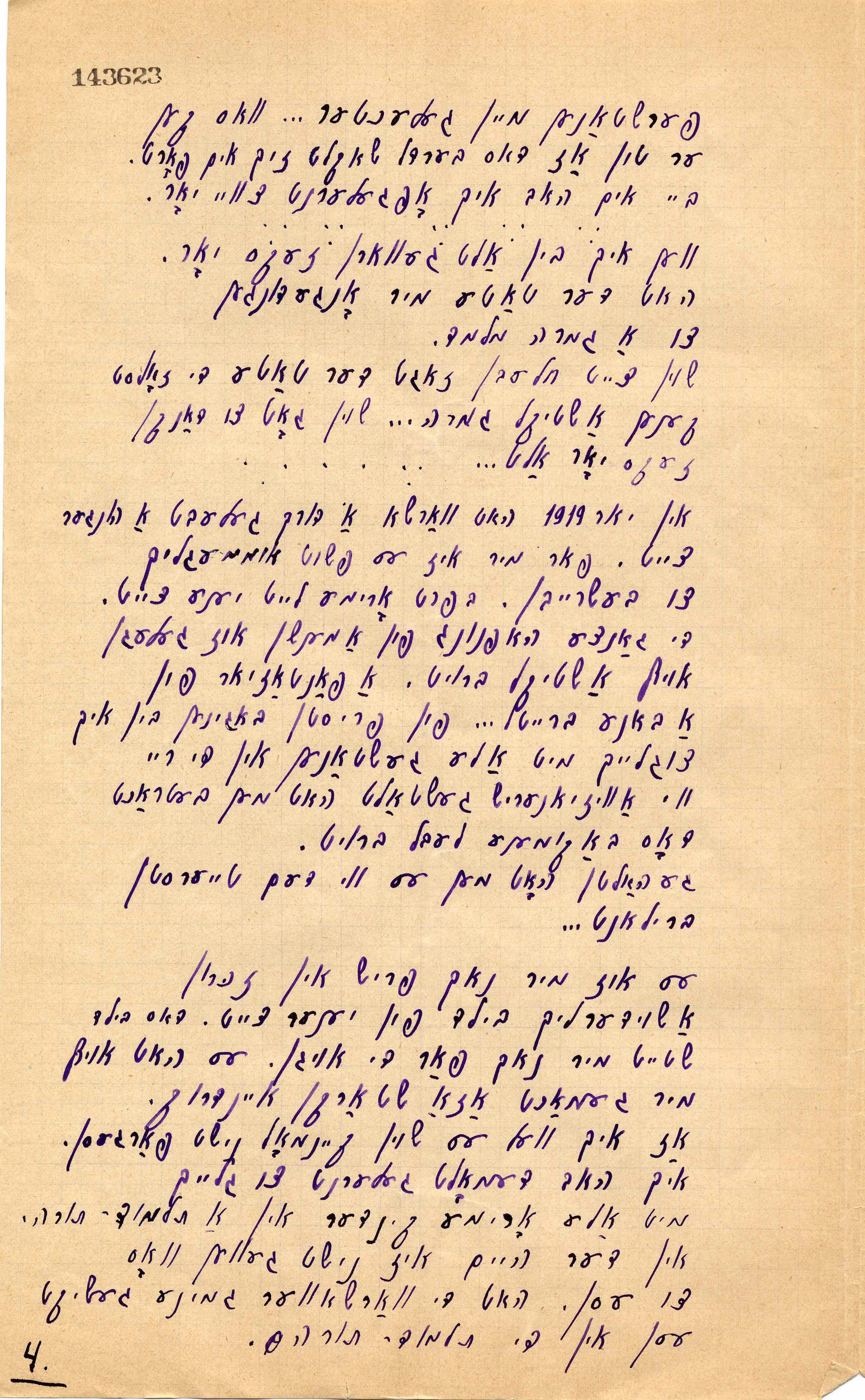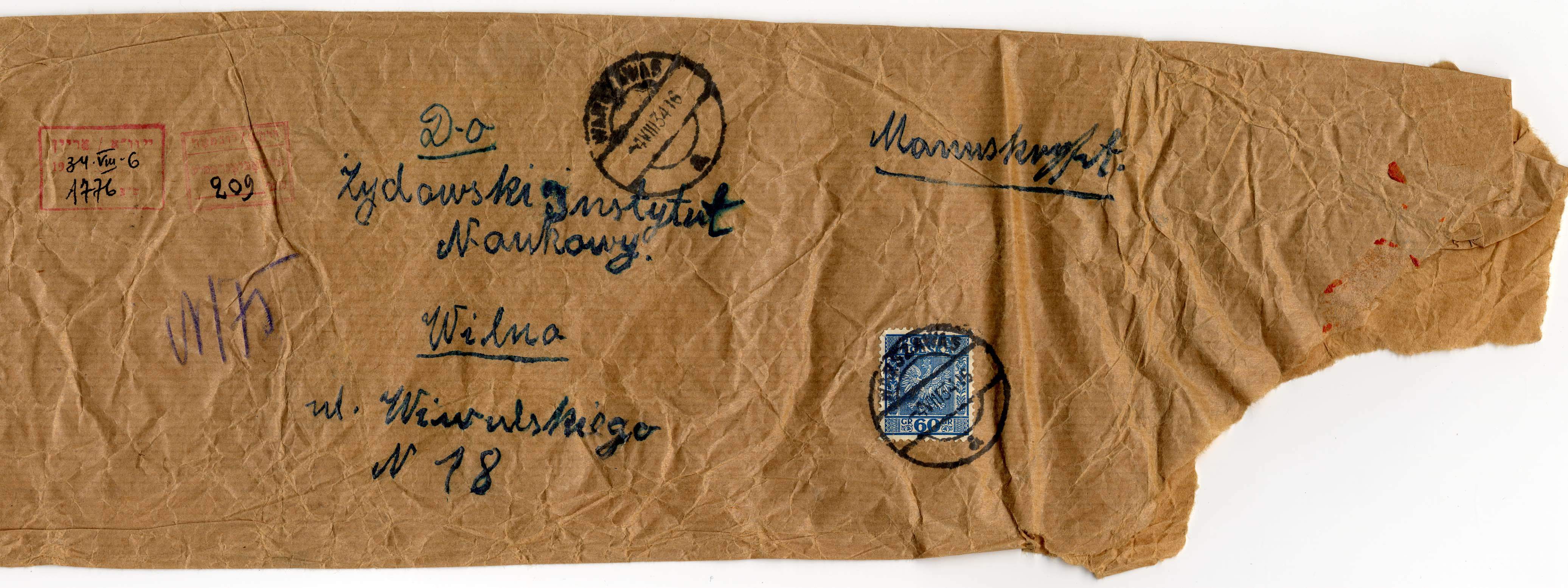Jan 10, 2016

The envelope in which RJ’s autobiography was sent to YIVO. (Credit: YIVO Institute for Jewish Research)
This is part two in a series of posts about an autobiography of a Polish youth from the 1930s found in the YIVO archives. You can read part 1 here; links to the entire series can be found here.
RJ’s autobiography opens with some basic information about the kind of family into which he was born. His family was Hasidic and poor, and he was one of twelve children, nine of whom were still alive at the time his memoir was written. His father was the shammes (beadle) of a Hasidic rabbi. When RJ turned two, the family moved from their shtetl to a large city.
But after these initial statements, instead of continuing the narrative of his life, RJ chooses to continue his autobiography with an anecdote: the “miraculous” story of his family’s move to the city. RJ reports that during the journey, the wagon carrying him and his family and their belongings broke down, and the family was left stranded in the middle of a road. The children began to cry. Suddenly, a drunken elderly man with a white-grey beard appeared, and stammered—half in Yiddish, half in Russian—that the children needn’t cry. With his stick he pointed toward a house. He said, “Go to that house and they’ll give you a brand new wagon.” They did as they were told, and just as the old man predicted, a wagon was given to them. When all had piled into the new wagon, they looked around for the drunk old man to thank him. They couldn’t find him anywhere; he’d vanished! RJ reports that his mother believed the old drunk was Elijah the prophet and that the generous wagon driver was an angel.
RJ explains that his mother stated the “fact” of the miracle with such innocence and conviction that it was easy to believe her. As a child, he himself had believed the story too, “one hundred percent.” And when he repeated it to his cheder-mates, they made him tell it over and over again, agog and envious.
The story of the broken wagon and the mysterious stranger coming to the rescue is emblematic of the hagiographical Hasidic tale. It features all the elements of the genre: a problem that seems insurmountable, a stranger with a grey/white beard, a miraculous rescue, and the disappearance of the stranger. What made RJ, who tries to underscore his “modernity” throughout his autobiography, choose to open his work with an anecdote that follows the form of the classic Hasidic tale? True, he scoffs at the notion of a miracle, concluding the tale with the single sentence, “Today, the entire story sounds merely like a pretty paradox”; nevertheless, he makes the choice to begin his autobiography with this tale, thus appearing to situate his text in relation to the classic Hasidic corpus of texts, despite his attempt to mock that very same heritage and storytelling tradition.
Curiously, RJ makes no explanation of how he came to this conclusion. How did he go from believing his mother’s story “one hundred percent” to considering it an absurdity? Had he studied the subject of miracles, or perhaps David Hume’s philosophies, 1 1 David Hume in section 10 of An Enquiry Concerning Human Understanding (1748) defines and explains the concept of miracles. and then drawn his own conclusion? Was he influenced by his modernizing peers who engendered in him a sense of cynicism? Because RJ doesn’t explain, we have no way of knowing when and how the change in his thinking occurred. But a few points are worth noting. Firstly, that he selects this anecdote as his opening story, through which, as he must have been aware, the reader would draw her or his first impression. Secondly, that he states his new viewpoint on the “miracle” in a matter-of-fact tone, as if no explanation is needed. It’s evident that at the time of his writing, RJ was already firmly enough entrenched in modern ideology to instinctively believe that the YIVO editor who would read his autobiography would have the same cynical approach to “miraculous events,” and so, there was no reason to expand on this topic. Thirdly, the opening miraculous anecdote functions as a powerful literary device, a hook that draws the reader in. Using this anecdote in the autobiography’s opening page indicates that RJ understood the makings of a good story, suggesting that he not only read fiction but also internalized its mechanisms.
But more intriguing than the literary premise is the psychological one. In the entire anecdote, RJ’s father isn’t referenced. The only parent mentioned is his mother, whose gullibility and belief in Elijah the prophet is held up to ridicule. Whether intentional or subliminal, RJ begins his autobiography by placing his mother in a negative light. Why? Was RJ’s disparagement of his mother indicative of his feelings toward women in general? If it was, was this an attitude he internalized from his childhood environment?
I searched RJ’s autobiography for more remarks about his mother, but besides referencing her in relation to the miracle story, he hardly mentions her at all. Nowhere else in the memoir does he criticize his mother specifically or indicate that she had been a bad parent or hurt him. It appears that RJ doesn’t disdain his mother in particular, but rather, he sees her gullibility and stupidity as representative of the female mental capacity. Later in the memoir, he expresses this derisive opinion of women more directly. He writes that he began reading philosophical literature, and Schopenhauer’s work transformed him. “Different thoughts, different opinions about women. In general, I accepted a negative position to the entire women problem.” 2 2 Arthur Schopenhauer, “On Women” (1851): https://en.wikisource.org/wiki/Of_Women He then cites Baudelaire’s view that “women shouldn’t be allowed in churches.” 3 3 Charles Baudelaire, Mon cœur mis à nu (Droz, 2001), 7. And he quotes Nietzsche in Zarathustra: “Where a man is in rage, the woman is vile,” and another of Nietzsche’s most notorious lines: “Are you going to women? Don’t forget the whip.” 4 4 Friedrich Wilhelm Nietzsche, Thus Spoke Zarathustra (1883). See The Portable Nietzsche (New York: Penguin Books, 1954), 179.
RJ seems to have extracted the most misogynistic quotations and adopted the most misogynistic views from the great modern philosophers. He appears to have tremendous bitterness toward women, presumably resulting from personal injurious experiences. It is frustrating that, as with the shift in his beliefs regarding miracles, RJ doesn’t tell the reader what led him from point A to point B. He merely states that, indeed, there had been a point A. “When I was younger,” he writes on page 20, “I naively believed that a woman is the romantic spirit of a man’s life. If not, a man would lose his essence.” But, he continues, “I think quite differently today. No longer, do I hold my former fantasies about them. Once I used to utter my ideas about them. Today I would rather be silent.”
RJ’s resentment of women is striking, and though we don’t know which woman (or women) instigated this hostility, it seems safe to assume that this opinion was formed during his personal, self-made encounter with modernity, and not one informed by the Jewish/Hasidic community he’d come from. If this particular form of misogyny were something he learned as part of his Jewish communal upbringing, RJ’s path might have been the reverse: he would have initially believed that women were base and later revised his opinion to appreciating them. But here it appears that his distrust of women, and his distrust of the miraculous, is tied to his experience of modernity.
But even if RJ’s misogyny wasn’t informed by his traditional Hasidic upbringing, it is obvious that his “Hasidism” is still manifest within him, complicating his ideas and his way of expressing them. Though RJ has defected from the Hasidic community—or, in his own words: “I threw off the heavy chains, freed my soul and body from the heavy iron crush”—the community’s norms are still entrenched in his mind. And so, the standard of beginning a discourse or document with a “wonder story” comes naturally to him. Despite his efforts, RJ hasn’t succeeded in leaving his childhood community behind.
In the next post, coming next week, descriptions of RJ’s childhood…




